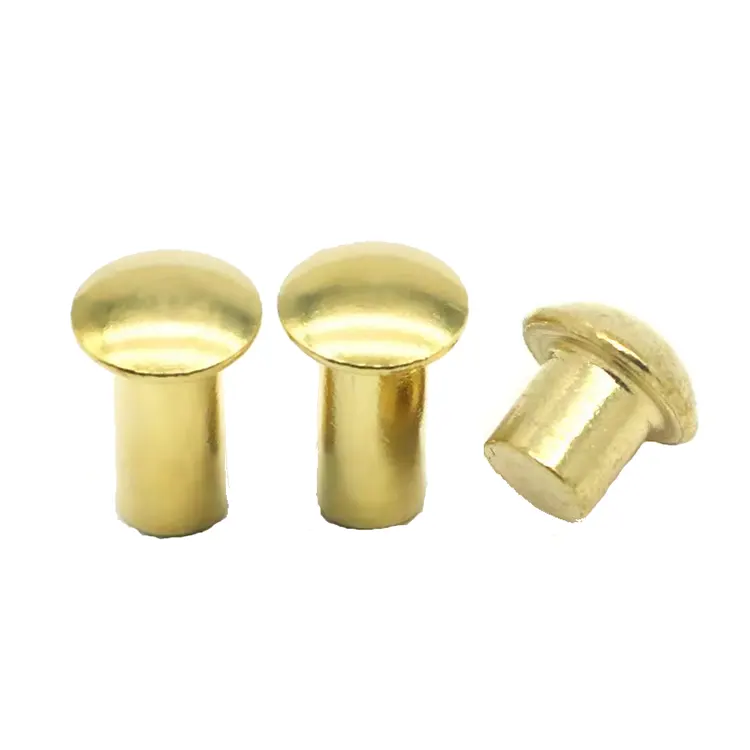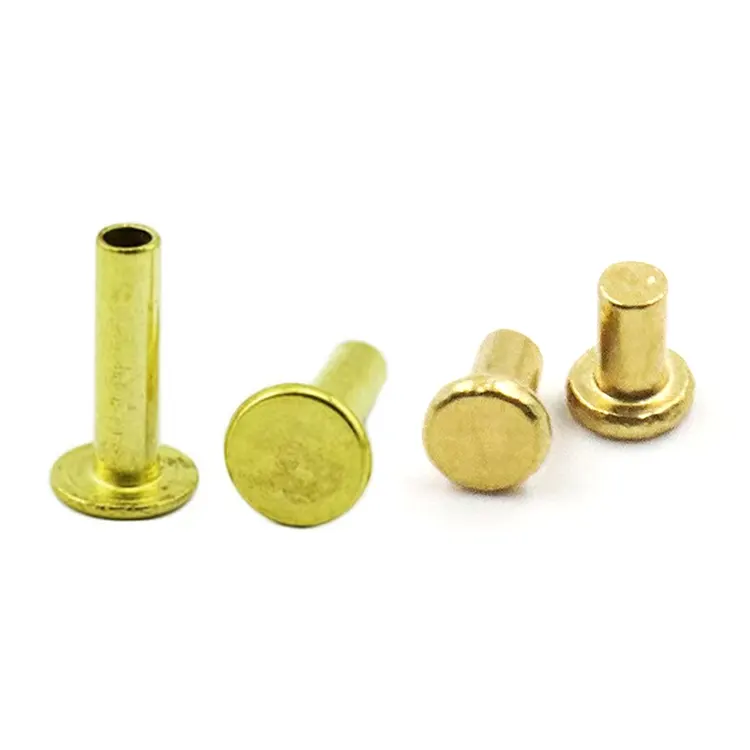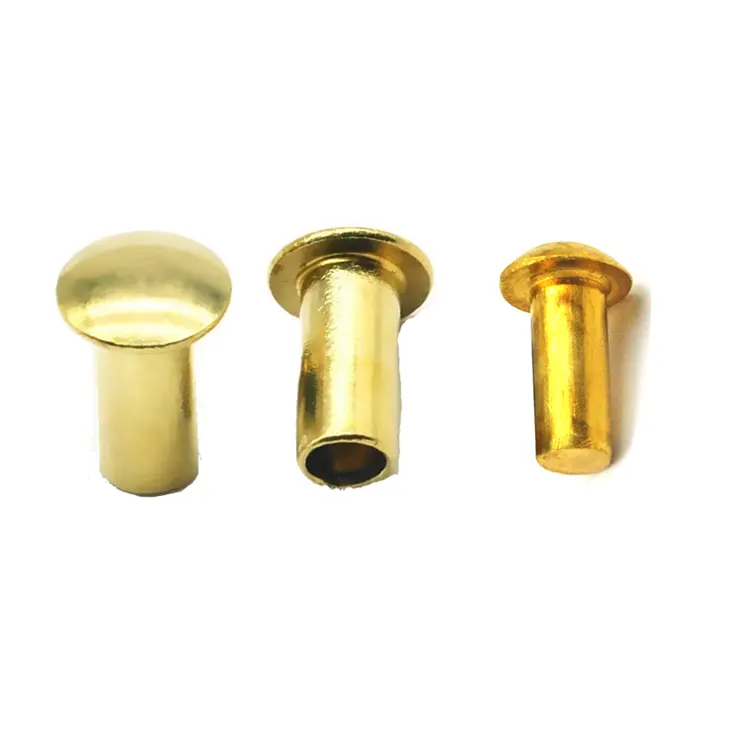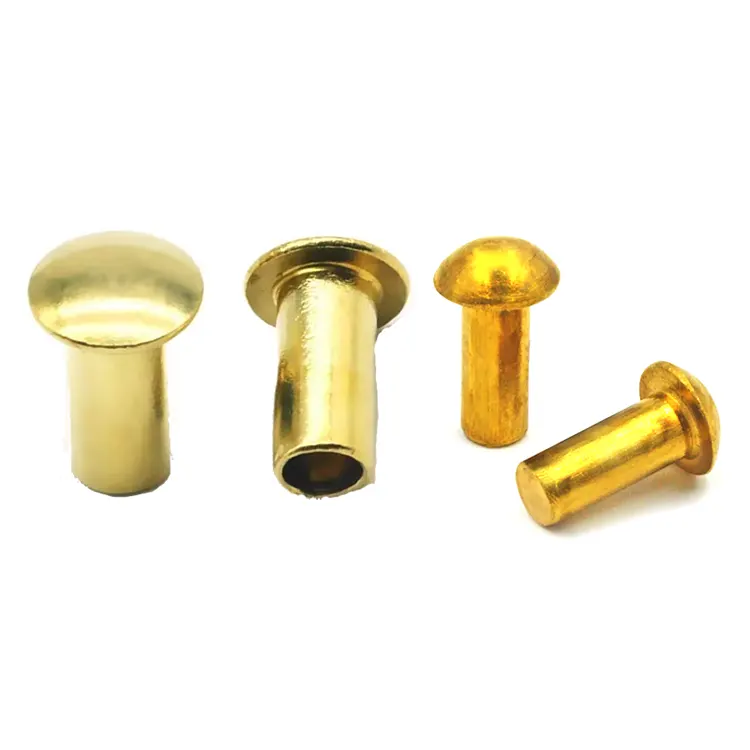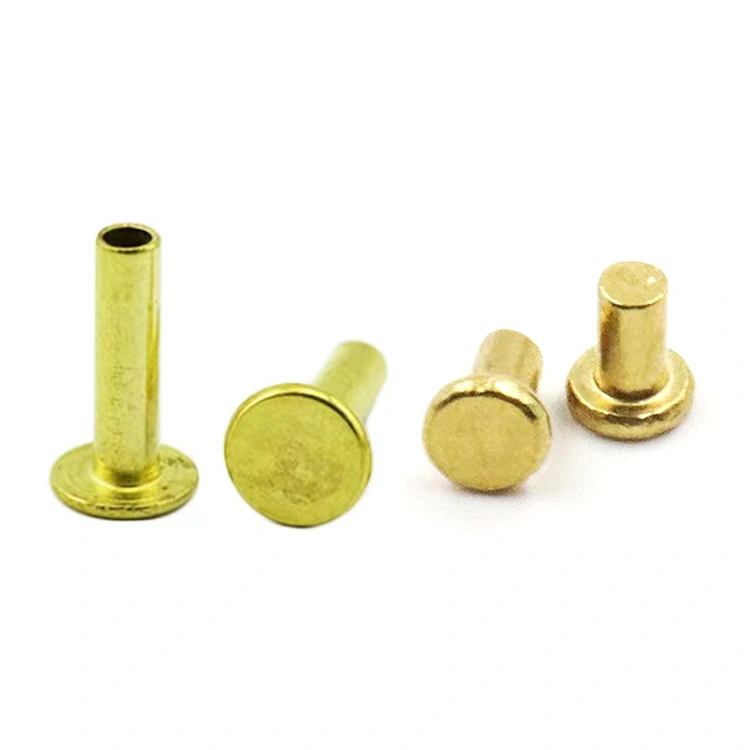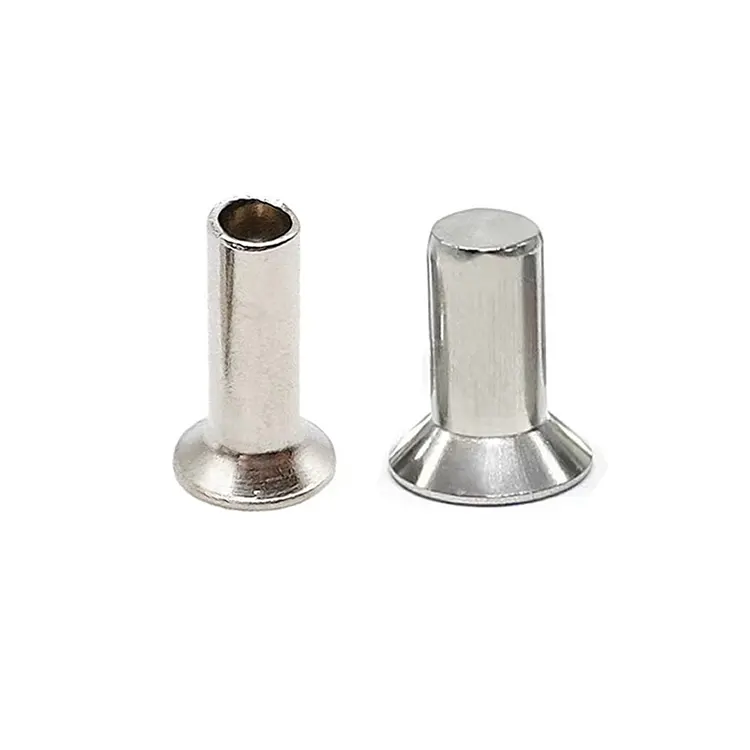Rebites
As one of professional manufacturer in China, Notin would like to provide you Rivets. And we will offer you the best after-sale service and timely delivery.
What is a rivet?
A rivet is a permanent mechanical fastener used to join two or more materials. Rivets work by inserting a metal pin into an aligned hole and deforming the end, creating a strong, secure, and durable connection. Unlike temporary fasteners like screws, rivets do not rely on threads, but instead form a permanent connection, making them ideal for applications requiring high strength, durability, and vibration resistance.
Classification of Rivets
Rivets are typically categorized by head shape, degree of hollowness, or material.
Based on head shape, rivets can be classified as flat head rivets, round head rivets, countersunk head rivets, mushroom head rivets, universal head rivets, truss head rivets, etc.

Based on degree of hollowness, rivets can be classified as solid rivets, semi-tubular rivets, or full tubular rivets.
Based on material, rivets can be classified as brass rivets, stainless steel rivets, steel rivets, aluminum rivets, copper rivets, etc.

What surface finishes are available for rivets?
Rivet surfaces are typically treated with rust-proofing treatments, primarily electroplating, including zinc plating, nickel plating, chrome plating, tin plating, gold plating, and silver plating. Electroplating is a common rust-proofing method for rivets. It applies a layer of plating to the rivet surface through physical or chemical methods. The plating effectively prevents corrosion and rust, while also providing a certain aesthetic effect.
Another special surface treatment method is head coating. Head coating is performed after the rivet is electroplated. This allows for a variety of colors on the rivet head, achieving an aesthetically pleasing finish.
Aluminum rivets cannot be electroplated, but they can be anodized. Anodizing also allows for a variety of color options, but the unit price is higher than electroplating.
Rust-proofing the rivet surface is crucial, effectively extending the rivet's service life and ensuring a secure connection. Different rust-proofing methods are suitable for different environments and applications, so the choice should be tailored to the specific situation.
- View as
Rebites de cabeça redonda de latão
A Nuote Metals é especializada na produção e venda de rebites de cabeça redonda em latão. Estamos localizados em Dongguan, China, uma cidade com forte desenvolvimento industrial. Nossos rebites de cabeça semi-bulgy de cobre consistem em uma haste e uma tampa feitas de liga de latão. O design da cabeça semi-protuberante proporciona distribuição uniforme da pressão, evitando danos à superfície articular. Eles são caracterizados por sua condutividade elétrica combinada e resistência à corrosão, construção simples, fácil instalação, alta confiabilidade e longa vida útil.
consulte Mais informaçãoEnviar consultaRebites de latão
A Nuote Metals produz rebites de latão na China. Os rebites de latão são feitos principalmente de liga de cobre e zinco, um material que oferece uma série de vantagens. A excelente resistência à corrosão do latão permite que ele resista ao uso prolongado em ambientes úmidos sem enferrujar, tornando-o adequado para uso externo ou em condições de alta umidade. O latão também possui resistência e dureza, permitindo-lhe suportar tensões mecânicas, mantendo boa tenacidade e resistindo à quebra. O latão também possui excelente condutividade elétrica e térmica, tornando-o adequado para uso em equipamentos eletrônicos e térmicos. A superfície lisa do latão permite fácil galvanoplastia ou polimento, melhorando sua estética. Essas propriedades tornam os rebites de latão a escolha preferida em muitos setores.
consulte Mais informaçãoEnviar consultaRebites de cabeça panela de latão
A Nuote Metals é especializada na produção de rebites de cabeça panela de latão. Nossos rebites são feitos de latão H65, que possui alto teor de latão, é macio e fácil de moldar e tem menos probabilidade de rachar durante o processo de rebitagem. Os rebites de cabeça panela de latão consistem em uma cabeça e uma haste, sendo a haste oca em aproximadamente metade de seu comprimento. Durante a instalação, o rebite é inserido em um furo pré-perfurado. Usando uma rebitadora e um punção especializados, a extremidade da haste se expande e forma a cabeça do outro lado, criando uma conexão de fixação. Este processo baseia-se na deformação plástica do metal, eliminando a necessidade de soldaduras ou adesivos, tornando-o simples e eficiente.
consulte Mais informaçãoEnviar consultaRebites de cabeça de cogumelo de latão
Os rebites de latão com cabeça de cogumelo consistem em uma cabeça e um corpo. A cabeça é redonda e ligeiramente achatada, lembrando uma tampa de cogumelo. O corpo é semi-oco, o que significa que tem um buraco no centro, mas não passa completamente. Estes são chamados de rebites de cabeça de cogumelo semi-ocos de latão. Alguns rebites têm um corpo sólido, chamados rebites sólidos de latão com cabeça de cogumelo. Durante a instalação, uma ferramenta especializada é usada para inserir o corpo no furo pré-perfurado. A pressão é aplicada para deformar o corpo, fazendo com que ele se expanda e agarre o material, criando uma conexão segura. A Nuote Metals é especializada na produção desses rebites de latão com cabeça de cogumelo.
consulte Mais informaçãoEnviar consultaRebites de cabeça plana de latão
Os rebites de cabeça chata de latão são hastes de metal com uma tampa em uma das extremidades. Eles conseguem rebitagem por meio de deformação ou ajuste interferente e são um fixador comum. O design da cabeça plana reduz as saliências da superfície, tornando-o adequado para aplicações que exigem alta planicidade. A resistência à corrosão do latão garante a estabilidade da conexão mesmo em ambientes úmidos e corrosivos. A Nuote Metals é especializada na produção de rebites de cabeça plana em latão. Temos milhares de moldes e podemos produzir uma variedade de especificações de rebites. Também oferecemos suporte a designs e amostras personalizadas.
consulte Mais informaçãoEnviar consultaRebites de cabeça escareada de latão
Os rebites de cabeça escareada de latão consistem principalmente em uma cabeça e uma haste. A cabeça escareada permite a instalação nivelada com a superfície da peça, eliminando saliências que podem afetar a aparência ou o funcionamento. A haste semi-oca deforma-se durante o processo de rebitagem, conseguindo uma conexão. Este design não só melhora a eficiência da instalação, mas também aumenta a confiabilidade da conexão. A Nuote Metals é especializada na fabricação de rebites de cabeça escareada em latão, com alta precisão e superfície lisa e livre de riscos. Congratulamo-nos com amigos de todo o mundo para visitar nossa empresa e colaborar conosco.
consulte Mais informaçãoEnviar consultaWhat are the advantages of rivets over other fasteners?
1. Ease of Installation
Rivets are fast to install, and even fully automated for high-volume applications, resulting in a simple and efficient operation process.
2. Connection Reliability
The riveting process is standardized, with strict quality control, resulting in highly stable connections. Visual inspection allows for quick verification of connection quality.
3. Vibration and Impact Resistance
Rivets connect through deformation or interference fit, providing strong clamping force and excellent vibration resistance, capable of withstanding vibration and shock.
4. Low Cost
Rivets are easy to install and can be fully automated, saving significant labor costs.
What are the advantages and disadvantages of rivets made of different materials?
Aluminum Rivets
Advantages: Lightweight, reduces overall product weight, low cost, suitable for general civilian applications.
Disadvantages: Low tensile and shear strength, unsuitable for high-strength workpieces, prone to electrochemical corrosion when in contact with metals such as stainless steel.
Stainless Steel Rivets
Advantages: Strong corrosion resistance, high hardness, suitable for high-strength workpieces (such as marine equipment)
Disadvantages: Higher cost, typically more expensive than aluminum rivets of the same specification.
Brass and Copper Rivets
Advantages: Excellent conductivity (such as connecting electronic components), good corrosion resistance.
Disadvantages: Higher cost, more difficult to process.
Steel Rivets
Advantages: High hardness, high connection reliability, and wide applicability.
Disadvantages: Compared to other materials, iron rivets are more prone to rusting.
What are the main applications of rivets?
Rivets have a wide range of uses, from small items like a pair of scissors to large items like airplanes and ships, as well as in high-precision medical applications.
Industrial Manufacturing
Rivets are used in a wide variety of industrial fields, wherever there is a need to connect two or more materials.
Electronics
Rivets secure heat sinks and chips, providing both vibration damping and noise reduction, and are widely used in the cooling systems of electronic products such as computers and mobile phones.
Automotive
Rivets are widely used to connect components of automobile bodies and chassis, such as doors and hoods. Their lightweight and corrosion-resistant properties make them an indispensable joining method in automotive manufacturing.
Aerospace
In aircraft manufacturing, rivets are used to connect different fuselage components, such as wings and tailplanes. Millions of rivets create high-strength, corrosion-resistant joints. Aluminum and titanium alloy rivets are often used to connect components of corresponding materials, ensuring stability in extreme environments.
Rivets are used everywhere. The above examples only represent a small number of their applications. We see rivets everywhere in our daily lives, such as on scissors, folding beds, and strollers etc. Rivets can be customized to different sizes and materials depending on the application.
Nuote Metals has specialized in the rivet industry for over a decade. Our factory is located in Dongguan, a city known as the "World Factory," a city with a developed industry and convenient transportation. This allows us to respond quickly when acquiring raw materials and supporting surface treatments, meeting our customers' needs for quick access to samples and bulk orders. We produce 10 million rivets daily and have molds of various specifications, allowing us to produce rivets as small as 0.8mm and as large as 10mm. We welcome your inquiries and visits.







